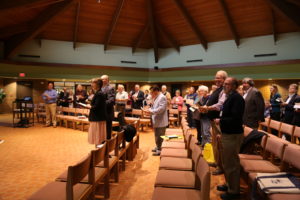 The West Virginia Conference of the United Methodist Church was honored to host the 2017 NEJ Commission on Archives and History Annual Meeting May 9-11.
The West Virginia Conference of the United Methodist Church was honored to host the 2017 NEJ Commission on Archives and History Annual Meeting May 9-11.
Close to 80 attendees from every state in the Northeastern Jurisdiction were welcomed to the capitol city of Charleston for a time of learning, worship, and gaining a deeper understanding of Methodism and West Virginia statehood.
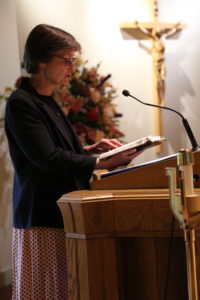
The meeting opened Tuesday with a beautiful worship service, led by West Virginia’s Bishop Sandra Steiner Ball. Bishop Sandra offered a thoughtful message based on Matthew 5:13-16, “You are the salt of the earth. But if the salt loses its saltiness, how can it be made salty again? It is no longer good for anything, except to be thrown out and trampled underfoot. You are the light of the world. A town built on a hill cannot be hidden. Neither do people light a lamp and put it under a bowl. Instead they put it on its stand, and it gives light to everyone in the house. In the same way, let your light shine before others, that they may see your good deeds and glorify your Father in heaven.”
Appropriately themed, Bishop Sandra’s message not only included one of our state’s most historic industries – salt – but spoke thoughtfully about our responsibility as Christians to act as true and salt and light on the Earth.
“Much of the opposition against the church is because the promise of transformation goes largely unfulfilled – irrelevant. Christians have neglected their responsibility to be salt and light. They have neglected to be what God calls us to be (salt and light) to come into contact with people who are in need of God….in contacts with our culture we must retain our saltiness. Our distinctiveness of being Christ-followers first. It’s a balancing act. Being in the world and not of the world. That’s a balance.”
Tuesday evening we welcomed Dr. Jane Donovan, Religious Studies Program professor at West Virginia University, as she shared about salt and Methodism in the Kanawha Valley. 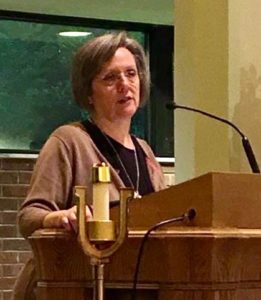
“Salt making was the first industry in West Virginia. It was salt that built the city of Charleston and it was salt that drew the first Methodist Circuit Riders to this region.”
Meeting attendees would soon have the opportunity to see one of the state’s oldest salt manufacturers, still operating today!
Wednesday morning, folks from all over the Eastern seaboard loaded up on two tour busses, and travelled the hills of West Virginia, visiting five significant spots that bring our rich history to life.
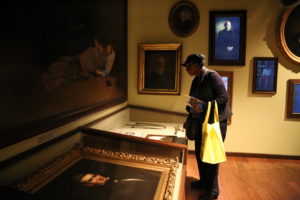
The first stop led passengers to the West Virginia State Museum located at the Capitol Complex in Charleston.
Recently renovated, the purpose of the State Museum is “dedicated to inspiring, educating and enriching the lives of the public by instilling a deeper understanding and sense of pride through the collection, preservation and exhibition of diverse cultural and historic traditions, focusing on every aspect of West Virginia history, culture, art, paleontology, archaeology and geology from all geographic regions – representing the people, land and industries,” according the museum website.
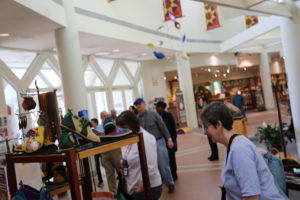
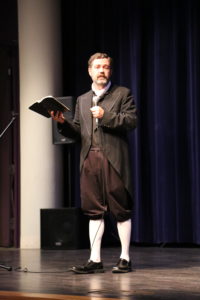 The notorious Tamarack was the second stop on the agenda for lunch, shopping local vendors, and hearing a theatrical version of Francis Asbury’s life, as told by WVUMC Dean of the Cabinet and Southern District Superintendent Rev. Dr. Joe Kenaston.
The notorious Tamarack was the second stop on the agenda for lunch, shopping local vendors, and hearing a theatrical version of Francis Asbury’s life, as told by WVUMC Dean of the Cabinet and Southern District Superintendent Rev. Dr. Joe Kenaston.
Tamarack’s striking, peaked red roof and wonderfully landscaped grounds draw half a million visitors annually into a welcome respite of visual beauty, Appalachian sounds, and distinctive aromas. With its unique retail artisan products and extraordinary food fare, The Tamarack started out as a simple vision to promote the Mountain State’s wonderful image.
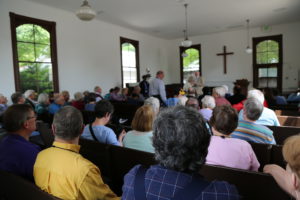 Next stop on the journey was Malden, W.Va. to the Booker T. Washington African Zion Baptist Church (right) and homestead, the worship place of Booker T. Washington, and the mother church of African-American Baptists in West Virginia. To learn more about the property, click here.
Next stop on the journey was Malden, W.Va. to the Booker T. Washington African Zion Baptist Church (right) and homestead, the worship place of Booker T. Washington, and the mother church of African-American Baptists in West Virginia. To learn more about the property, click here.
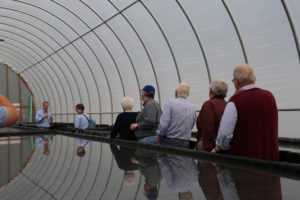 Just down the road in charming, small-town Malden, is the J.Q. Dickinson Salt-works. Meeting attendees walked the historic grounds and learned of how seventh-generation brother and sister Nancy Bruns and Lewis Payne, revived their family’s salt-making tradition on the very same land where it all began.
Just down the road in charming, small-town Malden, is the J.Q. Dickinson Salt-works. Meeting attendees walked the historic grounds and learned of how seventh-generation brother and sister Nancy Bruns and Lewis Payne, revived their family’s salt-making tradition on the very same land where it all began.
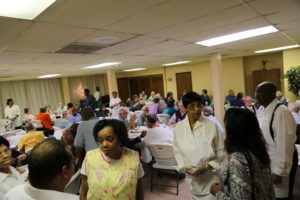 The NEJ Commission on Archives and History tour ended at Simpson Memorial United Methodist Church, located in downtown Charleston, W.Va. Rev Dr. Felica Wooten-Williams, pastor of Simpson UMC, and gracious members of the congregation greeted visitors with a delicious, homemade meal and West Virginia hospitality.
The NEJ Commission on Archives and History tour ended at Simpson Memorial United Methodist Church, located in downtown Charleston, W.Va. Rev Dr. Felica Wooten-Williams, pastor of Simpson UMC, and gracious members of the congregation greeted visitors with a delicious, homemade meal and West Virginia hospitality.
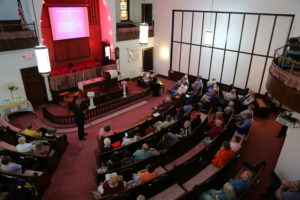 Later in the evening, we learned of West Virginia Statehood in relation to United Methodism in a presentation by Joe Geiger Jr., West Virginia Archives and History. It was revealed that, in fact, some key United Methodist ministers played an integral role in the creation and statehood of West Virginia!
Later in the evening, we learned of West Virginia Statehood in relation to United Methodism in a presentation by Joe Geiger Jr., West Virginia Archives and History. It was revealed that, in fact, some key United Methodist ministers played an integral role in the creation and statehood of West Virginia!
Thursday morning, the meeting wrapped up with a final business session and Communion Service.
The West Virginia Conference is blessed to have had the opportunity to host such a momentous gathering, and we thank everyone involved for helping in the planning and facilitation process!
To view all of the photos from the week’s events, please visit our Flickr page here: www.flickr.com/photos/wvumc/albums/72157683590466906